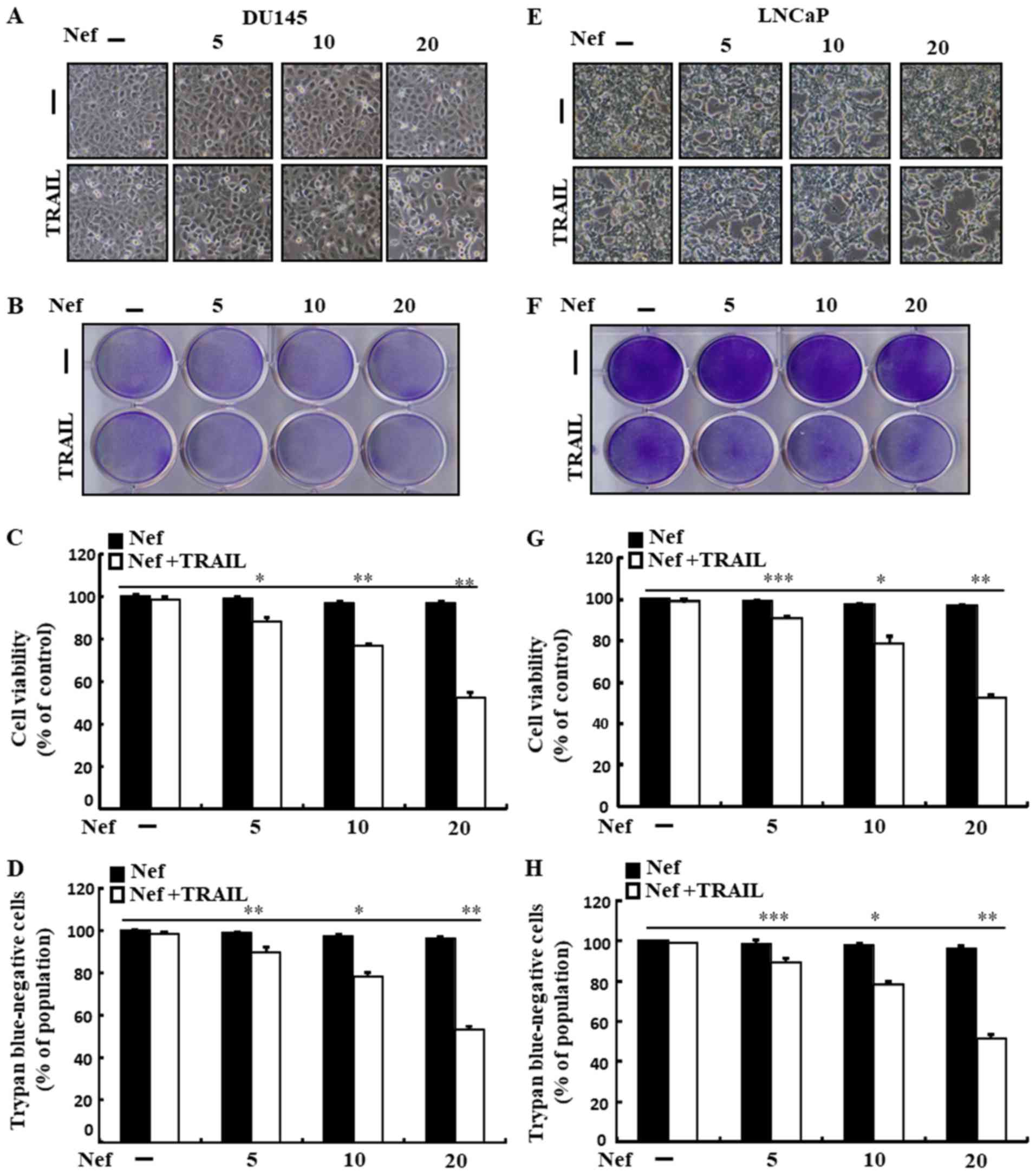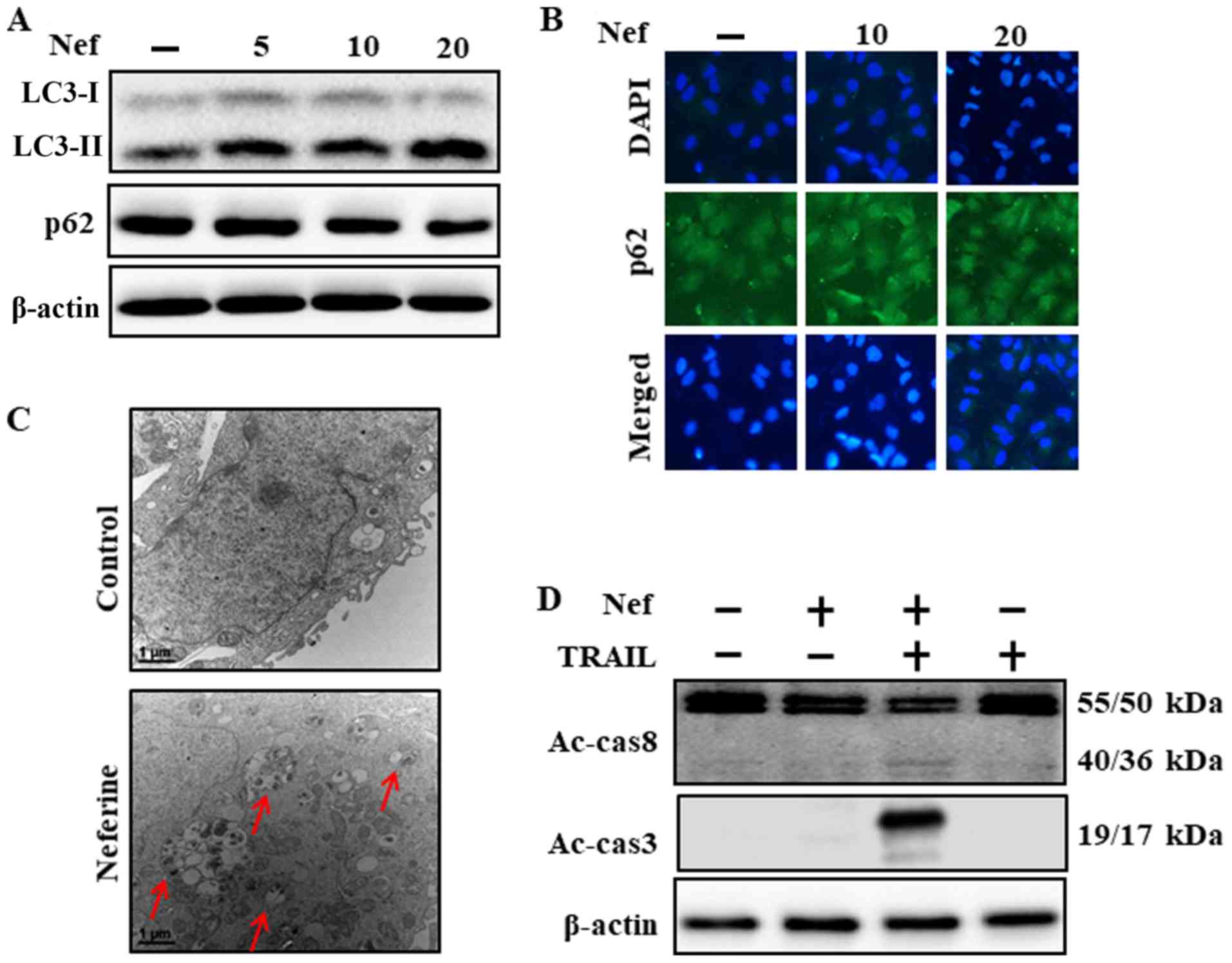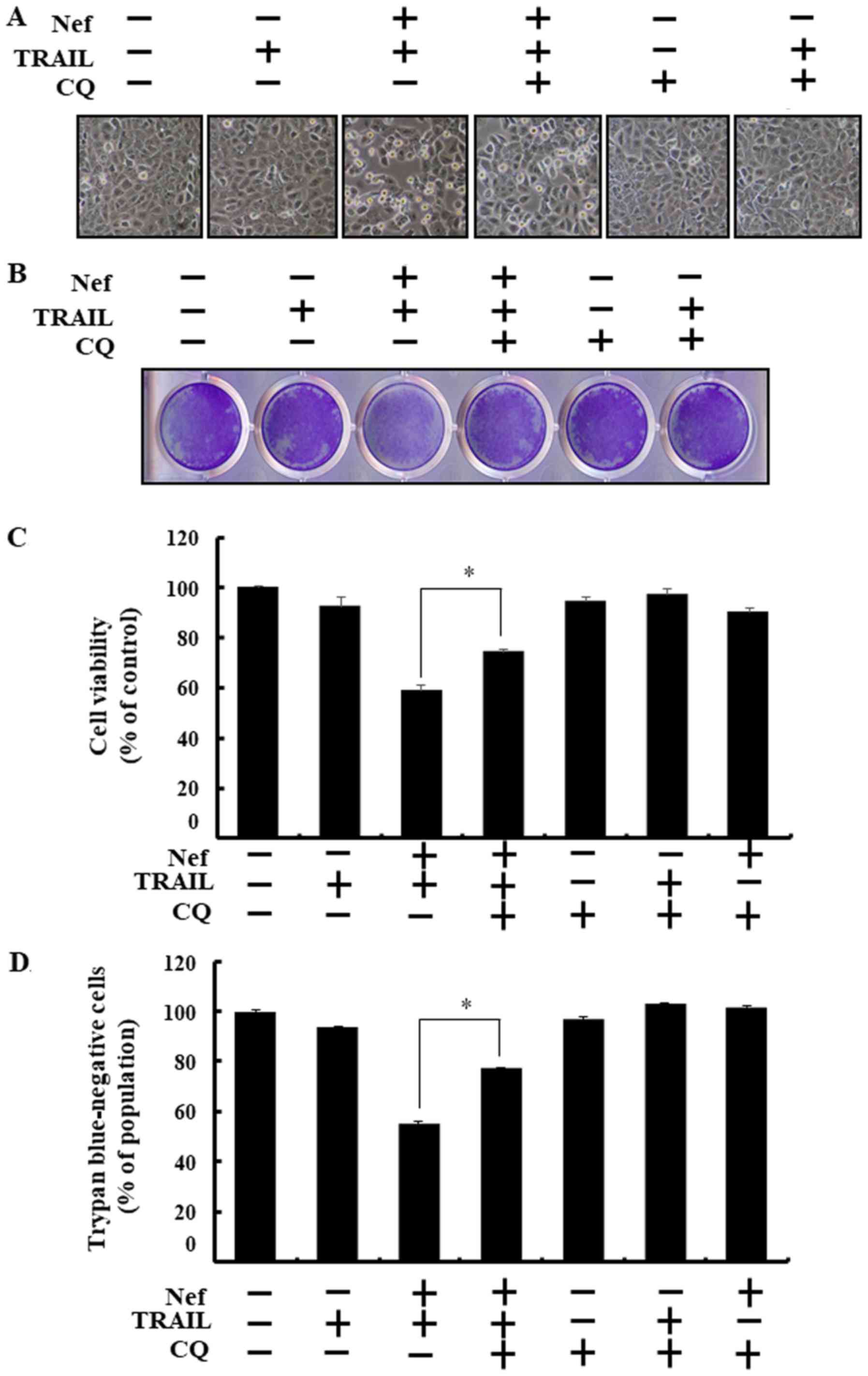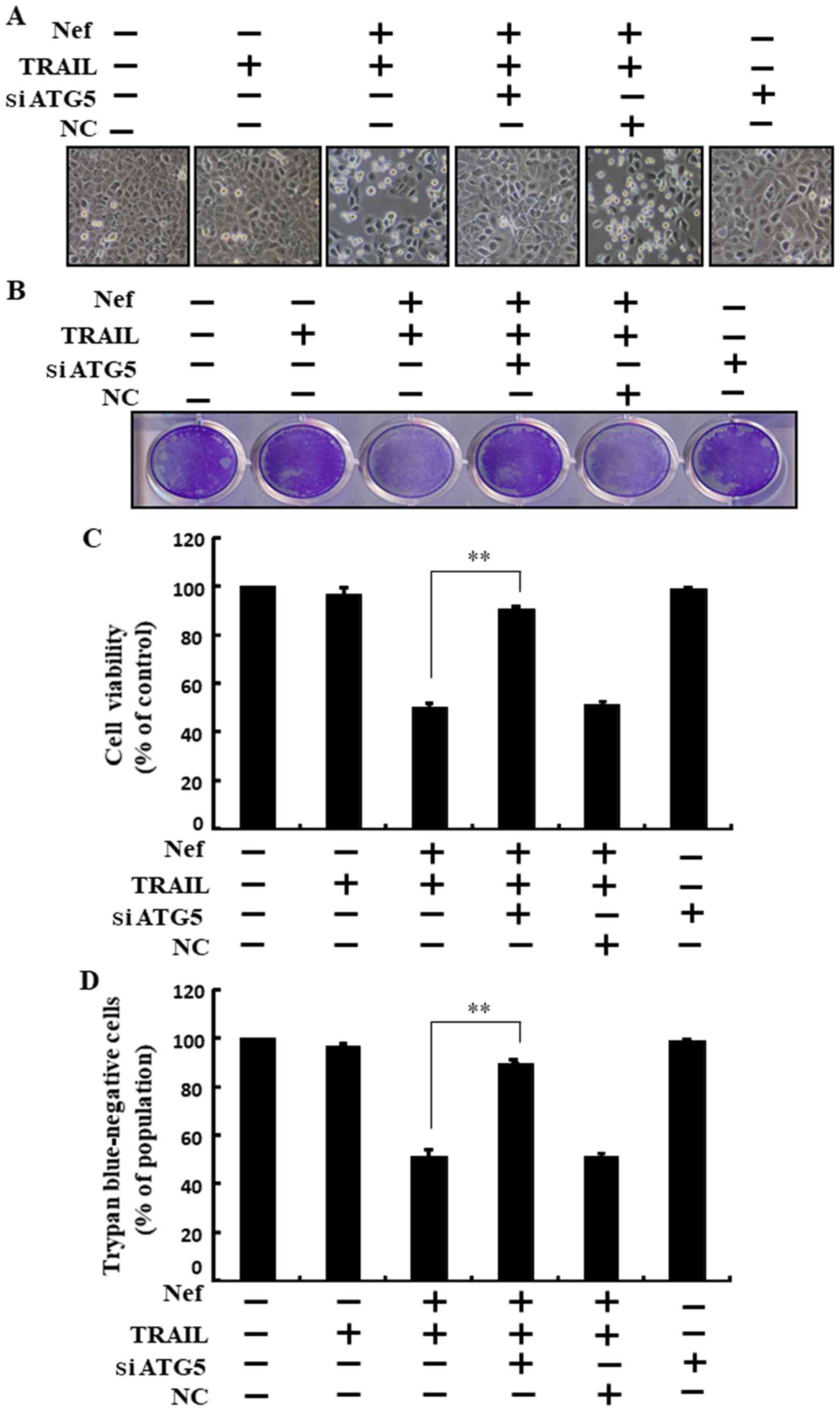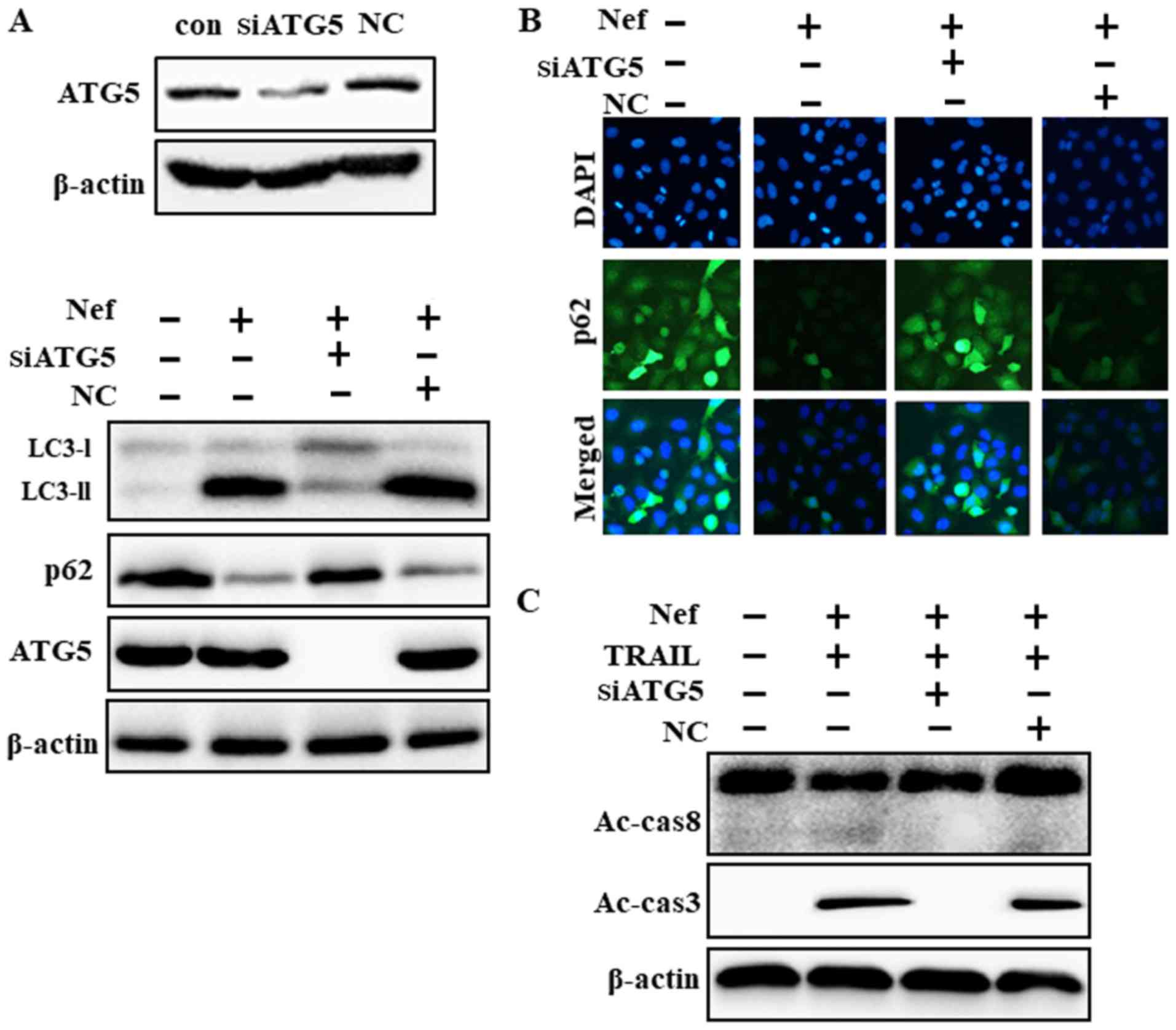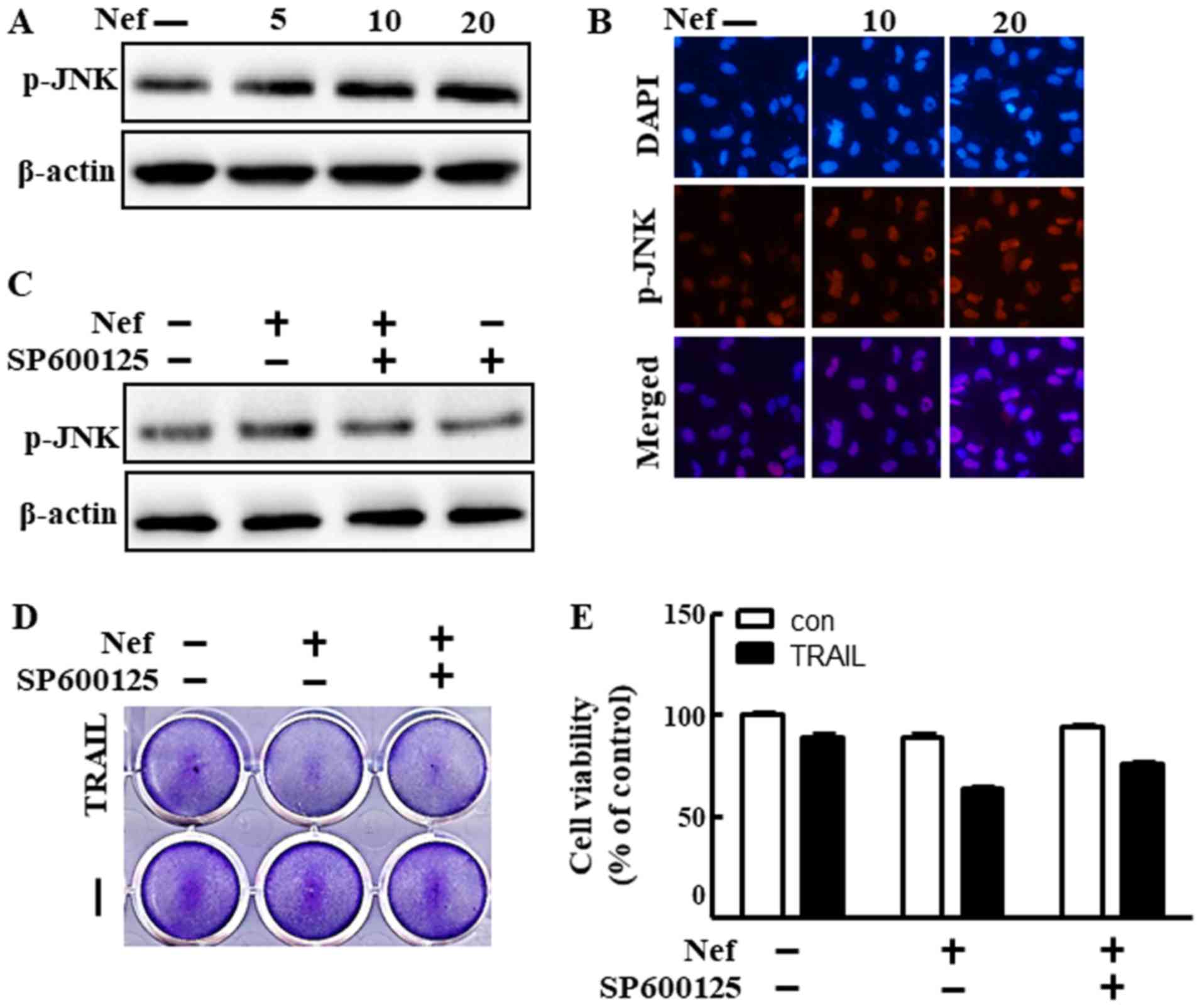|
1
|
Siegel R, Naishadham D and Jemal A: Cancer
statistics, 2012. CA Cancer J Clin. 62:10–29. 2012. View Article : Google Scholar : PubMed/NCBI
|
|
2
|
Hao L, Zhao Y, Li ZG, He HG, Liang Q,
Zhang ZG, Shi ZD, Zhang PY and Han CH: Tumor necrosis
factor-related apop-tosis-inducing ligand inhibits proliferation
and induces apoptosis of prostate and bladder cancer cells. Oncol
Lett. 13:3638–3640. 2017. View Article : Google Scholar : PubMed/NCBI
|
|
3
|
Nazim UM, Jeong JK and Park SY:
Ophiopogonin B sensitizes TRAIL-induced apoptosis through
activation of autophagy flux and downregulates cellular FLICE-like
inhibitory protein. Oncotarget. 9:4161–4172. 2018. View Article : Google Scholar : PubMed/NCBI
|
|
4
|
Zhang S, Wang Y, Chen Z, Kim S, Iqbal S,
Chi A, Ritenour C, Wang YA, Kucuk O and Wu D: Genistein enhances
the efficacy of cabazitaxel chemotherapy in metastatic
castration-resistant prostate cancer cells. Prostate. 73:1681–1689.
2013.PubMed/NCBI
|
|
5
|
Klosek M, Mertas A, Krol W, Jaworska D,
Szymszal J and Szliszka E: Tumor necrosis factor-related
apoptosis-inducing ligand-induced apoptosis in prostate cancer
cells after treatment with xanthohumol-a natural compound present
in humulus lupulus L. Int J Mol Sci. 17:pii: E837. 2016. View Article : Google Scholar : PubMed/NCBI
|
|
6
|
Wiley SR, Schooley K, Smolak PJ, Din WS,
Huang CP, Nicholl JK, Sutherland GR, Smith TD, Rauch C, Smith CA,
et al: Identification and characterization of a new member of the
TNF family that induces apoptosis. Immunity. 3:673–682. 1995.
View Article : Google Scholar : PubMed/NCBI
|
|
7
|
Wang S and El-Deiry WS: TRAIL and
apoptosis induction by TNF-family death receptors. Oncogene.
22:8628–8633. 2003. View Article : Google Scholar : PubMed/NCBI
|
|
8
|
Kischkel FC, Lawrence DA, Chuntharapai A,
Schow P, Kim KJ and Ashkenazi A: Apo2L/TRAIL-dependent recruitment
of endogenous FADD and caspase-8 to death receptors 4 and 5.
Immunity. 12:611–620. 2000. View Article : Google Scholar : PubMed/NCBI
|
|
9
|
Wei RJ, Zhang XS and He DL:
Andrographolide sensitizes prostate cancer cells to TRAIL-induced
apoptosis. Asian J Androl. 20:200–204. 2018. View Article : Google Scholar :
|
|
10
|
Sivalingam KS, Paramasivan P, Weng CF and
Viswanadha VP: Neferine potentiates the antitumor effect of
cisplatin in human lung adenocarcinoma cells via a
mitochondria-mediated apoptosis pathway. J Cell Biochem.
118:2865–2876. 2017. View Article : Google Scholar : PubMed/NCBI
|
|
11
|
Poornima P, Quency RS and Padma VV:
Neferine induces reactive oxygen species mediated intrinsic pathway
of apoptosis in HepG2 cells. Food Chem. 136:659–667. 2013.
View Article : Google Scholar
|
|
12
|
Poornima P, Weng CF and Padma VV:
Neferine, an alkaloid from lotus seed embryo, inhibits human lung
cancer cell growth by MAPK activation and cell cycle arrest.
Biofactors. 40:121–131. 2014. View Article : Google Scholar
|
|
13
|
Zhang X, Liu Z, Xu B, Sun Z, Gong Y and
Shao C: Neferine, an alkaloid ingredient in lotus seed embryo,
inhibits proliferation of human osteosarcoma cells by promoting p38
MAPK-mediated p21 stabilization. Eur J Pharmacol. 677:47–54. 2012.
View Article : Google Scholar : PubMed/NCBI
|
|
14
|
Li T, Su L, Zhong N, Hao X, Zhong D,
Singhal S and Liu X: Salinomycin induces cell death with autophagy
through activation of endoplasmic reticulum stress in human cancer
cells. Autophagy. 9:1057–1068. 2013. View Article : Google Scholar : PubMed/NCBI
|
|
15
|
Ouyang L, Shi Z, Zhao S, Wang FT, Zhou TT,
Liu B and Bao JK: Programmed cell death pathways in cancer: A
review of apoptosis, autophagy and programmed necrosis. Cell
Prolif. 45:487–498. 2012. View Article : Google Scholar : PubMed/NCBI
|
|
16
|
Liu YP, Li L, Xu L, Dai EN and Chen WD:
Cantharidin suppresses cell growth and migration, and activates
autophagy in human non-small cell lung cancer cells. Oncol Lett.
15:6527–6532. 2018.PubMed/NCBI
|
|
17
|
White E: The role for autophagy in cancer.
J Clin Invest. 125:42–46. 2015. View
Article : Google Scholar : PubMed/NCBI
|
|
18
|
Parzych KR and Klionsky DJ: An overview of
autophagy: morphology, mechanism, and regulation. Antioxid Redox
Signal. 20:460–473. 2014. View Article : Google Scholar :
|
|
19
|
Fan S, Qi M, Yu Y, Li L, Yao G, Tashiro S,
Onodera S and Ikejima T: P53 activation plays a crucial role in
silibinin induced ROS generation via PUMA and JNK. Free Radic Res.
46:310–319. 2012. View Article : Google Scholar : PubMed/NCBI
|
|
20
|
Kuntz S, Wenzel U and Daniel H:
Comparative analysis of the effects of flavonoids on proliferation,
cytotoxicity, and apoptosis in human colon cancer cell lines. Eur J
Nutr. 38:133–142. 1999. View Article : Google Scholar : PubMed/NCBI
|
|
21
|
Bonavida B, Ng C, Jazirehi A, Schiller G
and Mizutani Y: Selectivity of TRAIL-mediated apoptosis of cancer
cells and synergy with drugs: The trail to non-toxic cancer
therapeutics. Int J Oncol. 15:793–1595. 1999.PubMed/NCBI
|
|
22
|
Ji D, Zhang Z, Cheng L, Chang J, Wang S,
Zheng B, Zheng R, Sun Z, Wang C, Zhang Z, et al: The combination of
RAD001 and MK-2206 exerts synergistic cytotoxic effects against
PTEN mutant gastric cancer cells: Involvement of MAPK-dependent
autophagic, but not apoptotic cell death pathway. PLoS One.
9:e851162014. View Article : Google Scholar : PubMed/NCBI
|
|
23
|
Nazim UM, Moon JH, Lee JH, Lee YJ, Seol
JW, Eo SK, Lee JH and Park SY: Activation of autophagy flux by
metformin down-regulates cellular FLICE-like inhibitory protein and
enhances TRAIL-induced apoptosis. Oncotarget. 7:23468–23481. 2016.
View Article : Google Scholar : PubMed/NCBI
|
|
24
|
Labsch S, Liu L, Bauer N, Zhang Y,
Aleksandrowicz E, Gladkich J, Schönsiegel F and Herr I:
Sulforaphane and TRAIL induce a synergistic elimination of advanced
prostate cancer stem-like cells. Int J Oncol. 44:1470–1480. 2014.
View Article : Google Scholar : PubMed/NCBI
|
|
25
|
Lagadec C, Adriaenssens E, Toillon R,
Chopin V, Romon R, Van Coppenolle F, Hondermarck H and Le Bourhis
X: Tamoxifen and TRAIL synergistically induce apoptosis in breast
cancer cells. Oncogene. 27:1472–1477. 2008. View Article : Google Scholar
|
|
26
|
Zhu H, Ding WJ, Wu R, Weng QJ, Lou JS, Jin
RJ, Lu W, Yang B and He QJ: Synergistic anti-cancer activity by the
combination of TRAIL/APO-2L and celastrol. Cancer Invest. 28:23–32.
2010. View Article : Google Scholar
|
|
27
|
Oh YT, Yue P, Wang D, Tong JS, Chen ZG,
Khuri FR and Sun SY: Suppression of death receptor 5 enhances
cancer cell invasion and metastasis through activation of
caspase-8/TRAF2-mediated signaling. Oncotarget. 6:41324–41338.
2015. View Article : Google Scholar : PubMed/NCBI
|
|
28
|
Han B, Yao W, Oh YT, Tong JS, Li S, Deng
J, Yue P, Khuri FR and Sun SY: The novel proteasome inhibitor
carfilzomib activates and enhances extrinsic apoptosis involving
stabilization of death receptor 5. Oncotarget. 6:17532–17542. 2015.
View Article : Google Scholar : PubMed/NCBI
|
|
29
|
von Karstedt S, Montinaro A and Walczak H:
Exploring the TRAILs less travelled: TRAIL in cancer biology and
therapy. Nature reviews. Cancer. 17:352–366. 2017.
|
|
30
|
Selvarajoo K: A systems biology approach
to overcome TRAIL resistance in cancer treatment. Prog Biophys Mol
Biol. 128:142–154. 2017. View Article : Google Scholar : PubMed/NCBI
|
|
31
|
Poornima P, Weng CF and Padma VV: Neferine
from Nelumbo nucifera induces autophagy through the inhibition of
PI3K/Akt/mTOR pathway and ROS hyper generation in A549 cells. Food
Chem. 141:3598–3605. 2013. View Article : Google Scholar : PubMed/NCBI
|
|
32
|
Klionsky DJ and Emr SD: Autophagy as a
regulated pathway of cellular degradation. Science. 290:1717–1721.
2000. View Article : Google Scholar : PubMed/NCBI
|
|
33
|
Petersen A, Larsen KE, Behr GG, Romero N,
Przedborski S, Brundin P and Sulzer D: Expanded CAG repeats in exon
1 of the Huntington's disease gene stimulate dopamine-mediated
striatal neuron autophagy and degeneration. Hum Mol Genet.
10:1243–1254. 2001. View Article : Google Scholar : PubMed/NCBI
|
|
34
|
Kim SW, Lee JH, Moon JH, Nazim UM, Lee YJ,
Seol JW, Hur J, Eo SK, Lee JH and Park SY: Niacin alleviates
TRAIL-mediated colon cancer cell death via autophagy flux
activation. Oncotarget. 7:4356–4368. 2016.
|
|
35
|
Zhang Y, Wu Y, Cheng Y, Zhao Z, Tashiro S,
Onodera S and Ikejima T: Fas-mediated autophagy requires JNK
activation in HeLa cells. Biochem Biophys Res Commun.
377:1205–1210. 2008. View Article : Google Scholar : PubMed/NCBI
|
|
36
|
Stuckey DW and Shah K: TRAIL on trial:
Preclinical advances in cancer therapy. Trends Mol Med. 19:685–694.
2013. View Article : Google Scholar : PubMed/NCBI
|
|
37
|
Xu L, Zhang X, Li Y, Lu S, Lu S, Li J,
Wang Y, Tian X, Wei JJ, Shao C and Liu Z: Neferine induces
autophagy of human ovarian cancer cells via p38 MAPK/JNK
activation. Tumour Biol. 37:8721–8729. 2016. View Article : Google Scholar : PubMed/NCBI
|
|
38
|
Musumeci G, Castrogiovanni P, Trovato FM,
Weinberg AM, Al-Wasiyah MK, Alqahtani MH and Mobasheri A:
Biomarkers of chondrocyte apoptosis and autophagy in
osteoarthritis. Int J Mol Sci. 16:20560–20575. 2015. View Article : Google Scholar : PubMed/NCBI
|
|
39
|
Fiandalo MV and Kyprianou N: Caspase
control: Protagonists of cancer cell apoptosis. Exp Oncol.
34:165–175. 2012.PubMed/NCBI
|
|
40
|
Huang K: Mechanism of Bax/Bak Activation
in Apoptotic Signaling (unpublished PhD thesis). University of
Nebraska Medical Center; 2019
|
|
41
|
Ly JD, Grubb DR and Lawen A: The
mitochondrial membrane potential (deltapsi(m)) in apoptosis; an
update. Apoptosis. 8:115–128. 2003. View Article : Google Scholar : PubMed/NCBI
|
|
42
|
Tounekti O, Belehradek J Jr and Mir L:
Relationships between DNA fragmentation, chromatin condensation,
and changes in flow cytometry profiles detected during apoptosis.
Exp Cell Res. 217:506–516. 1995. View Article : Google Scholar : PubMed/NCBI
|
|
43
|
Yoshii SR and Mizushima N: Monitoring and
measuring autophagy. Int J Mol Sci. 18:18652017. View Article : Google Scholar :
|
|
44
|
Tanida I, Ueno T and Kominami E: LC3 and
autophagy. Methods Mol Biol. 445:77–88. 2008. View Article : Google Scholar : PubMed/NCBI
|
|
45
|
Ganesher A, Chaturvedi P, Sahai R, Meena
S, Mitra K, Datta D and Panda G: New spisulosine derivative
promotes robust autophagic response to cancer cells. Eur J Med
Chem. 188:1120112020. View Article : Google Scholar : PubMed/NCBI
|
|
46
|
Han X, Guo L, Jiang X, Wang Y, Wang Z and
Li D: Curcumin inhibits cell viability by inducing apoptosis and
autophagy in human colon cancer cells. Proceed Anticancer Res.
3:21–25. 2019.
|
|
47
|
Chiou JT, Huang CH, Lee YC, Wang LJ, Shi
YJ, Chen YJ and Chang LS: Compound C induces autophagy and
apoptosis in parental and hydroquinone-selected malignant leukemia
cells through the ROS/p38 MAPK/AMPK/TET2/FOXP3 axis. Cell Biol
Toxicol. Jan 3–2020.Epub ahead of prin. View Article : Google Scholar : PubMed/NCBI
|
|
48
|
Opipari AW Jr, Tan L, Boitano AE, Sorenson
DR, Aurora A and Liu JR: Resveratrol-induced autophagocytosis in
ovarian cancer cells. Cancer Res. 64:696–703. 2004. View Article : Google Scholar : PubMed/NCBI
|















